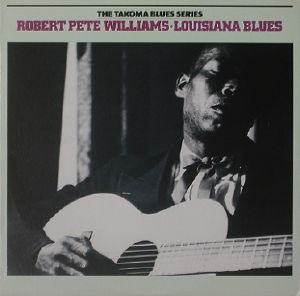
- Format: FLAC

Most of you are probably familiar with the legendary Takoma Records label, established by master guitarist John Fahey in 1959. Although this venture eventually branched out into other musical styles during the 1960s and 1970s, it never strayed far from its original focus on acoustic instrumentalists, blues singers, experimental artists, and various types of roots-inspired performers. Since that time, the company's catalogue has been acquired by three larger corporate entities: Chrysalis (1979), Fantasy (1995), and Concord (2004). The first parent company - with a roster that included extremely dissimilar acts typified by Pat Benatar, Jethro Tull, and Ultravox - would seem to have been the least compatible, a theory supported by the brief three-year period that the subsidiary's master tapes were under their control. During that time, however, Chrysalis engaged in an impressive vinyl reissue campaign of Takoma's outstanding series of blues albums. With the exception of not using the original cover artwork, the larger label did a nice job with these rereleases. Not surprisingly, the LPs did not sell and were quickly consigned to cutout bins, making them easy to find in used record stores throughout the 1980s and 1990s.
PONDERING LIFE AS A FREE MAN SOMETIME IN THE MID 1960s
When this album was recorded and originally released in 1966, Robert Pete Williams already had a small but supportive group of fans who championed him as one of the greatest discoveries of the postwar blues revival. Ethnomusicologists Harry Oster and Richard Allen found him at the infamous Angola State Penitentiary in Louisiana serving a life sentence (for shooting another man) while the pair toured the South making field recordings. With their assistance, Williams was paroled in 1958, although he essentially lived as an indentured servant on a farm until the mid 1960s, which greatly curtailed his musical activities. His appearance at the 1964 Newport Folk Festival marked his first performance outside of his home state, and he was able to start playing the college and coffeehouse circuit with rediscovered prewar bluesmen and other recently-unearthed rural black musicians (e.g. Mississippi Fred McDowell, Mance Lipscomb, etc.) the following year. After making recordings for labels such as Arhoolie, Sonet, and (of course) Takoma and taking part in a 1966 European tour, the singer-guitarist settled down to enjoy a normal life of freedom for the remainder of the decade. The 1970s found him returning to concert and festival appearances in a professional capacity, which gradually became less frequent until his death in 1980.
ROBERT PETE WILLIAMS, LABORER AND GUITARIST
Titled simply Louisiana Blues, this lone effort for Takoma may very well be the definitive LP by Robert Pete Williams, one of the most unorthodox blues musicians who ever lived. His unique artistic approach rendered him distinct from other performers with whom he often shared bills. While Williams's playing style was a refreshing change of pace from the hackneyed variety of blues peddled by many of his contemporaries, it also did much to limit his appeal among those accustomed to less challenging music. I'll admit that I didn't like this album very much when I first got it 15 or so years ago because something about it just didn't sound "right." As my musical horizons broadened over time, however, the songs began to grow on me, and I learned to appreciate Williams's idiosyncratic talent. To my non-musician's ears, it sounds like he often employs a distinct call-and-response method of performing whereby his improvisatory guitar lines follow the lead established by his equally extemporaneous and singular lyrics. The liner notes by Canned Heat guitarist Al "Blind Owl" Wilson more or less support my contention, and I suggest that you read them for a much more detailed analysis of this blues musician's technique. Due to its sui generis nature, the songs on this LP defy easy description. For lack of a better way to put it, "Freight-Train Blues," "It's Hard to Tell," the epic "This Is a Mean Old World," and "It's a Long Old Road" are quintessential Robert Pete Williams since none of these tracks sound like any other blues musician. "Somebody Help Poor Me" seems to have been inspired by Tommy Johnson's "Big Road Blues" but is interpreted in a completely original fashion. On the other hand, "I'm Going Down Slow" bears no similarities to the like-titled Jimmy Oden composition as far as I can tell. "Motherless Children Have a Hard Time" demonstrates Williams's ability to handle spiritual pieces just as well as he does secular material, with "Ugly" (aka "I've Grown So Ugly") being his best-known work by virtue of Captain Beefheart's cover version on Safe As Milk. "So Long Boogie" is the most straightforward blues item on this album, not that there is anything wrong with that. The significance of the title of "High As I Want to Be" remains obscure since it is practically an instrumental performance. But as such, it displays this bluesman's ingenious guitar picking style to excellent effect.